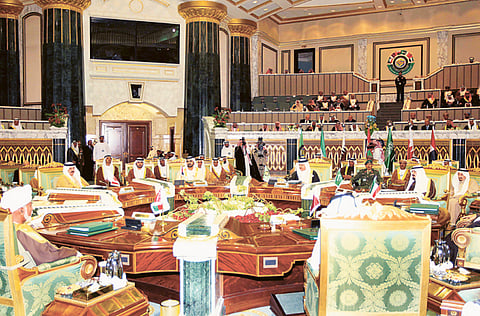Major breakthrough at Riyadh summit
GCC summit makes notable breakthroughs, at least on two economic integration

The 32nd summit of Gulf Cooperation Council (GCC) held in the Saudi capital city of Riyadh has made notable breakthroughs at least on two economic integration proposals and indirectly hinting at a third.
In particular, steady progress was made with regard to the Gulf Common Market (GCM) and customs union proposals. Still, the call for turning the entity from the status of cooperative body to that of a union necessitates material progress on the third integrating proposal, namely the monetary union.
More specifically, the communiqué stressed the implementation of a standardised customs union tariff from the start of January 2012.
It is assumed that the body involved, namely the finance and financial cooperation committee, has addressed outstanding issues related to the implementation of this key element of the project.
Launched in 2003, the customs union scheme has repeatedly failed to meet deadlines. In reality, the scheme has encountered serious challenges ever since its inception, notably relating to developing a formula for fair distribution of customs duties among member countries. Undoubtedly, any formula cannot overlook critical issues such as port of entry and final destination of goods.
Full implementation
Certainly, the full implementation of the customs union should send a message to all parties concerned including the World Trade Organisation (WTO). This in turn should bring the GCC to the customs union status, meeting WTO requirements with respect to rules and procedures.
In fact, an agreement on the customs union proposal is essential for preparing the group to reach free trade talks with other countries.
Likewise, progress was made with regard to the GCM project concerning the approval of standard rules for financial markets across GCC countries. The development suggests the emergence of unified rules for placement of stocks, securities and investment funds in financial markets in GCC states.
However, member countries are expected to fully adhere to standardised rules following a two-year following pilot experiment.
The allotted time span uniquely fits this period, in turn not noted for having exceptional trading activities. In reality, the index for all GCC bourses combined has dropped by 5.4 per cent in the third quarter of 2011. This translates into loss of a hefty $40 billion (Dh146.8 billlion) in market value.
The losses reflected sentiments felt in many parts of the world on the back of problems associated with values of both the Euro and dollar, debt debacle in some European countries and economic growth problems in major economies including China and India.
At any rate, the GCM calls for free flow of factors of production among member states. The scheme covers all economic and investment services in addition to dealing in the stock market and setting up of companies in both public and private. In practice, the GCM aims at unifying regional markets through which GCC nationals could benefit from available opportunities.
However, the final communiqué made no mention of the more contentious integrating proposal of the Gulf Monetary Union (GMU).
The project was launched at the start of 2010 but with no specific deadline for its full implementation.
Possible reasons for this include experience of delayed implementation of the customs union on the one hand and absence of support from all members to the proposal. Only Saudi Arabia, Qatar, Kuwait and Bahrain are parties to the move.
The final goals include unifying monetary and fiscal policies including introduction of a single currency for all member countries.
Unified currency
Nevertheless, calls for a unified currency are not popular nowadays partly reflecting Eurozone's experience. Still, judged by the main theme of the 32nd summit, chances are the GCC grouping turning from the status of cooperation to that of union at least on the political front.


